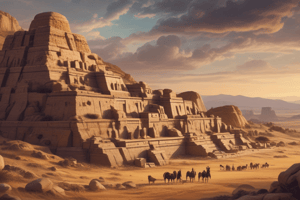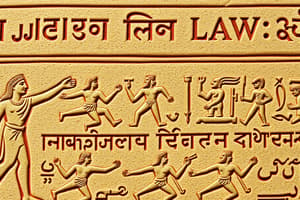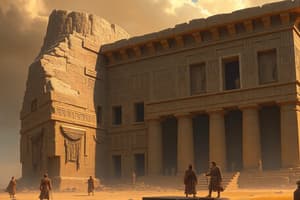Podcast
Questions and Answers
What role does Illuyanka play in Hittite mythology?
What role does Illuyanka play in Hittite mythology?
- A representation of chaos or darkness (correct)
- The chief deity of the Hittites
- A hero who battles Teshub
- A mortal who aids Kumarbi
Which of the following figures is considered the father of the gods in Hurrian mythology?
Which of the following figures is considered the father of the gods in Hurrian mythology?
- Teshub
- An
- Ullikummi
- Kumarbi (correct)
What is the significance of parricide in mythologies?
What is the significance of parricide in mythologies?
- It is a form of punishment for the gods
- It symbolizes divine reproduction without a partner
- It signifies the revolt against established order (correct)
- It denotes the act of creating new deities
Which deity is known as the storm god similar to Zeus in Hittite mythology?
Which deity is known as the storm god similar to Zeus in Hittite mythology?
What term describes the primordial void in Greek mythology?
What term describes the primordial void in Greek mythology?
What does the Omphalos represent in Greek mythology?
What does the Omphalos represent in Greek mythology?
Which goddess personifies memory and gives rise to culture through her children?
Which goddess personifies memory and gives rise to culture through her children?
What creature in Greek mythology is created by Kumarbi to attack Teshub?
What creature in Greek mythology is created by Kumarbi to attack Teshub?
What do the 100-handed giants, known as Hecatoncheires, primarily represent?
What do the 100-handed giants, known as Hecatoncheires, primarily represent?
What is the primary role of Nemesis in Greek mythology?
What is the primary role of Nemesis in Greek mythology?
Which goddess is associated with magic and the underworld, often viewed as a 'triple goddess'?
Which goddess is associated with magic and the underworld, often viewed as a 'triple goddess'?
Who is the Titan that overthrew Ouranos and was later overthrown by Zeus?
Who is the Titan that overthrew Ouranos and was later overthrown by Zeus?
What do the Fates in Greek mythology control?
What do the Fates in Greek mythology control?
Which goddess is described as the goddess of love, beauty, and desire, emerging from sea foam?
Which goddess is described as the goddess of love, beauty, and desire, emerging from sea foam?
What does the concept of the Triple Goddess represent?
What does the concept of the Triple Goddess represent?
Who is known for their immense strength and challenges Zeus for cosmic dominance?
Who is known for their immense strength and challenges Zeus for cosmic dominance?
Flashcards are hidden until you start studying
Study Notes
Anatolia
- Large peninsula in modern-day Turkey
- A crossroads of cultures and religions
- Important in ancient Hittite, Greek, and Near Eastern mythologies
Hittite Mythology
- Illuyanka: A dragon or serpent representing chaos
- Teshub: Storm god and chief deity, similar to Zeus, battles Illuyanka
- Hupasiyas: Mortal hero who helps Teshub defeat Illuyanka through trickery
Hurrian Mythology
- Kumarbi: Father of the gods, attempts to overthrow sky god Anu
- Ullikummi: A stone giant created by Kumarbi to attack Teshub
Mesopotamian Mythology
- An (Anu): Supreme god of the heavens in Sumerian and Akkadian mythologies
- Ea (Enki): God of wisdom and water, often helps other gods foil Kumarbi's plans
Parricide
- Act of killing one's father
- A recurring theme in mythologies, symbolizing the cycle of power and rebellion
Greek Mythology
- Omphalos: Sacred stone at Delphi, believed to be the center of the world
- Muses: Goddesses of arts and sciences, daughters of Mnemosyne, inspire creativity
- Mnemosyne: Personification of memory, gives rise to culture and history
- Chaos: Primordial void from which all things emerged
- Earth (Gaia): Personification of the Earth, born from Chaos, gives birth to Titans
- Tartaros: Abyss and prison for Titans, symbolizing darkness and punishment
- Eros: God of love and procreation, represents attraction in creation myths
Parthenogenesis
- Reproduction without sexual intercourse
- Found in myths where deities give birth alone signifying divine autonomy
- Ouranos: Sky god, husband of Gaia, father of Titans, Cyclopes, and Hecatoncheires
- Cyclopes: One-eyed giants, skilled blacksmiths, created weapons for the gods
- 100-handed giants (Hecatoncheires): Giants with immense strength, represent primal forces of nature
- Kronos: Titan who overthrows Ouranos, later overthrown by his son Zeus
- Erinyes (Furies): Deities of vengeance, pursue those who commit familial crimes
- Nymphe: Minor deities of nature, embody beauty and vitality
- Aphrodite: Goddess of love, beauty, and desire, emerged from the sea foam
- Inanna-Ishtar: Sumerian and Akkadian goddess of love, war, and fertility
- Hekate: Goddess of magic, crossroads, and the underworld, embodies maiden, mother, and crone
- Triple Goddess: Concept of a single goddess embodying three stages of womanhood
The Fates
- Clotho: Spins the thread of life
- Lachesis: Measures the thread of life
- Atropos: Cuts the thread of life
Other Greek Deities
- Nemesis: Goddess of retribution, punishes hubris
- Hybris: Excessive pride or defiance against the gods
- Eris: Goddess of strife and discord, often causes conflict
- Typhon: Monstrous giant with dragon heads, challenges Zeus for dominance
- Zeus: King of the gods, ruler of the sky, enforces cosmic order
- Metis: Goddess of wisdom and craft, swallowed by Zeus who later births Athena
- Hera: Zeus's wife, queen of the gods, goddess of marriage and family
- Athena: Daughter of Zeus, goddess of wisdom, strategy, and war
- Hephaistos: God of blacksmiths and fire, skilled in metalwork, often depicted as lame
Studying That Suits You
Use AI to generate personalized quizzes and flashcards to suit your learning preferences.




